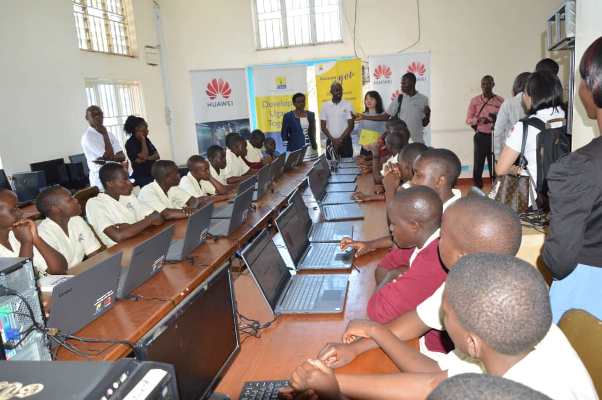Tororo Girls School students with laptops donated by URA and Huawei
The cabinet is proposing free and compulsory Primary and Secondary Education when schools reopen early next year.
The cabinet that met on Monday agreed that all forms of charges that have been collected from learners in Universal Primary Education-UPE and Universal Secondary Education –USE schools should be abolished.
Dr. Chris Baryomunisi, the Minister in charge of ICT and National Guidance, notes that as one of the measures to address the challenges, learning should be made free to ensure that all learners get an opportunity of returning to school without being incapacitated with charges that are usually levied from them.
However, information obtained by URN indicates that the decision is directed towards only USE schools and it might not be effected in government-aided non-USE schools most of which are governed by faith-based foundation bodies.
Dr. Baryomunisi further noted that the cabinet decision has a special interest in secondary education where many learners, even before COVID19, have been finding challenges to join due to the high fees collected from them.
The cabinet decision comes at a time when the National Planning Authority has released a report indicating that at least 4.5 million out of the 15 million learners that were in schools before the COVID-19 pandemic hit Uganda are likely not to return to school.
The NPA report shows about 64.6 percent of the parents expected to struggle or even fail to pay tuition a factor that will also increase non-enrollment, school dropouts, and dead years. The projection is tagged on reports showing that the COVID-19 coping measures have pushed poverty levels from 21 percent to 24 percent and are likely to push 40.6 percent of non-poor households to become poor.
In 2007, Uganda became the first country in sub-Saharan Africa to introduce universal secondary education coming 10 years after it introduced universal primary education. At the time, a UN report said Africa had the worst secondary school enrollment rates in the world with many learners being locked out of school by financial and cultural constraints among other factors.
However, with limited funding, many school management committees and PTAs in Universal Primary education and universal Secondary Education slowly introduced different payments like development fees, PTA fees, lunch fees among others.
Whereas schools state that education is free, when different charges instituted are added, the charges have been making huge sums of money that several unprivileged learners could not afford.
Dr. Denis Mugimba, the Ministry of Education Spokesperson, notes that the education ministry supported by the Norwegians has commissioned a study that will help the government to understand how schools have been utilizing the PTA fees.
Baryomunisi notes that the government through the ministry of education will soon launch a national wide campaign that will create a dialogue with several actors to create awareness about vices that have happened to children during the covid19 lockdown and agree on sustainable solutions.
He says that the agreement is also geared towards ensuring that all learners that have been affected with different vices including defilement, early marriages, among others are reintegrated back into schools next year.





